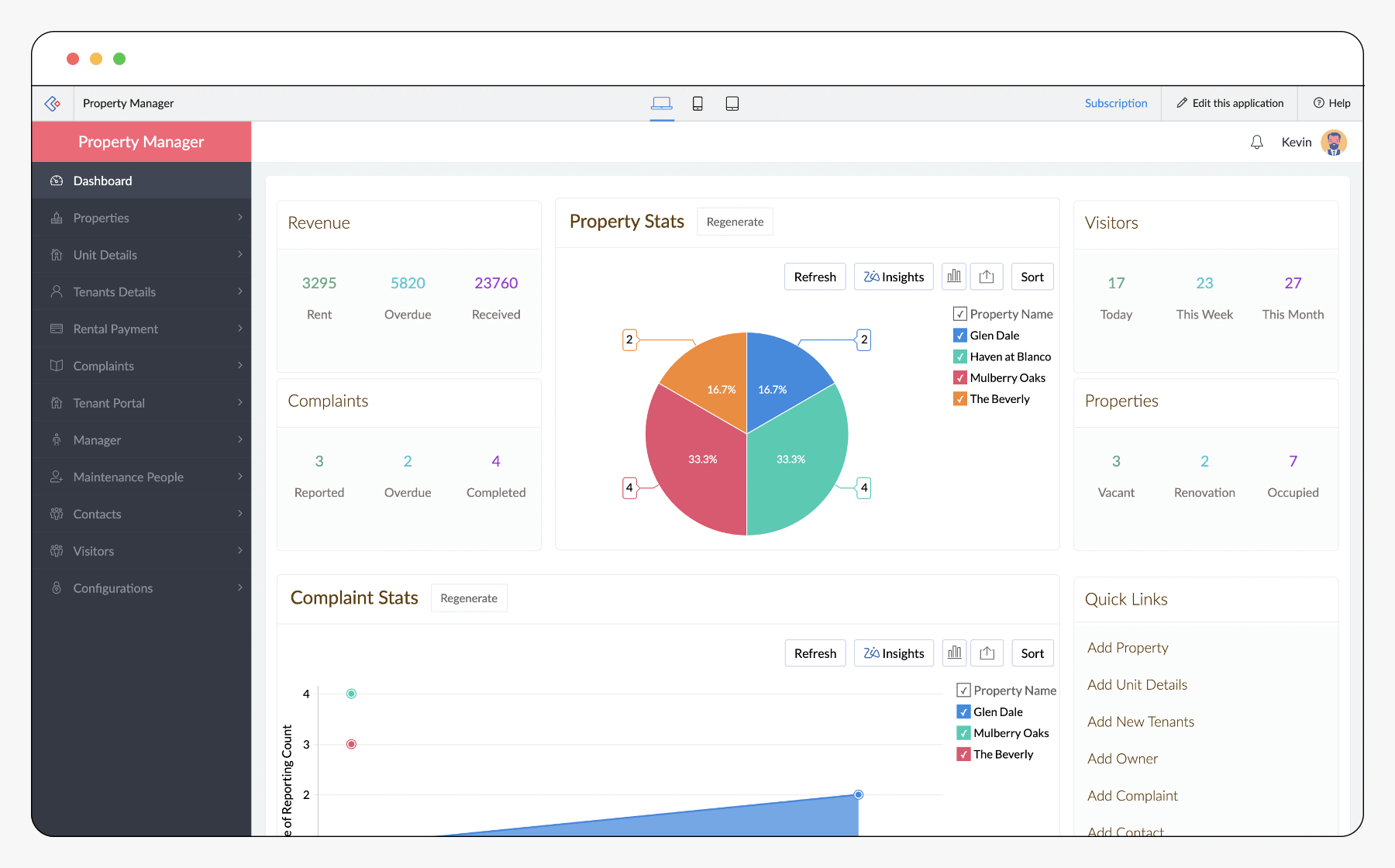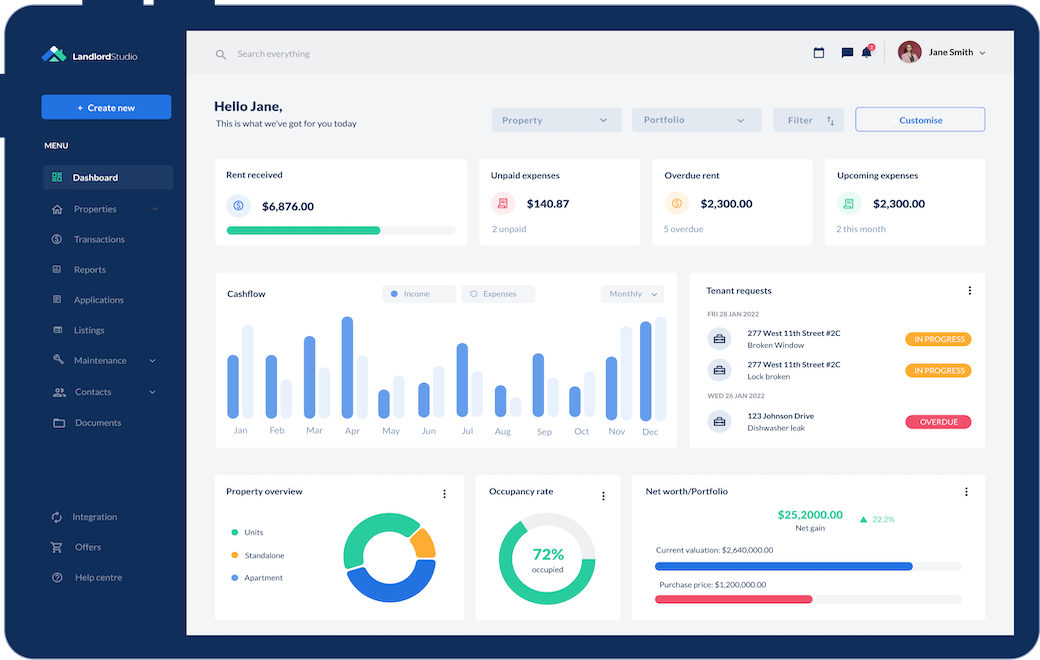Property Management Software: The Ultimate Tool for Streamlined Operations
In today’s digital age, property management software has become an essential tool for landlords, property managers, and real estate investors. Whether you manage a single rental property or a large portfolio, leveraging the right software can significantly improve the efficiency of your operations, reduce costs, and enhance tenant satisfaction.
In this article, we’ll explore the importance of property management software, its key features, and how it can streamline the day-to-day management of rental properties. We’ll also provide insights on selecting the right software for your needs.

Why Property Management Software is a Game-Changer
As a property manager or landlord, the responsibilities can quickly add up. From tenant screening and lease agreements to rent collection and maintenance requests, there are numerous tasks to handle. Property management software can make these tasks more manageable by automating many processes, improving accuracy, and saving time.
Here are some of the key reasons why property management software is invaluable:
1. Automation of Repetitive Tasks
A significant benefit of property management software is automation. Repetitive tasks such as rent collection, lease renewals, and payment reminders can be automated, reducing the workload for property managers. This frees up valuable time, allowing you to focus on higher-priority tasks like property maintenance or tenant relations.
For example, automated reminders can notify tenants when rent is due or when maintenance checks are scheduled. This proactive approach helps avoid late payments and ensures that issues are addressed promptly.
2. Centralized Data Storage
Property management software allows all property-related data to be stored in one central location. This includes tenant details, lease agreements, payment history, and maintenance requests. Having everything in one place makes it easier to access critical information when needed, improving both decision-making and communication.
Moreover, cloud-based property management software ensures that this information is secure and accessible from anywhere. Whether you’re in the office or on the go, you can access important property details with just a few clicks.
3. Tenant and Lease Tracking
Managing tenant relationships can be challenging without the right tools. Property management software provides a system for tracking tenants, leases, and payments. This can include features such as:
- Tenant profiles: Track personal details, contact information, and rental history.
- Lease management: Stay on top of lease dates, renewals, and terms.
- Payment history: Easily track rent payments, late fees, and outstanding balances.
With all this information at your fingertips, you can quickly respond to tenant inquiries and ensure that lease agreements are up to date.
4. Efficient Maintenance Management
Handling maintenance requests is one of the most time-consuming aspects of property management. Property management software can help streamline this process by allowing tenants to submit maintenance requests online. These requests can be automatically tracked, and you can assign tasks to maintenance staff or contractors.
By using maintenance management features in your software, you can ensure that issues are addressed in a timely manner and that tenants are kept informed throughout the process. Additionally, regular maintenance reminders can help prevent issues before they become major problems.

5. Financial Management and Reporting
Property management involves handling significant financial transactions, such as rent collection, utility payments, and vendor invoices. Property management software provides tools to automate these financial tasks and generate detailed reports. Some common financial features include:
- Online payment processing: Allow tenants to pay rent online, reducing delays and errors associated with traditional payment methods.
- Expense tracking: Monitor operating expenses, such as property repairs, insurance, and taxes.
- Financial reports: Generate monthly, quarterly, or yearly reports to track income and expenses, making tax season much easier.
These tools help property managers stay organized and ensure that all financial transactions are accurate and transparent.
6. Communication and Collaboration Tools
Effective communication is essential for maintaining strong relationships with tenants and vendors. Property management software often includes built-in messaging tools that allow property managers to communicate directly with tenants, contractors, and maintenance staff.
For example, you can send reminders about upcoming rent due dates, notify tenants of scheduled maintenance, or answer inquiries about the property. Some platforms also enable tenants to submit feedback or report issues, fostering better communication between both parties.
Key Features to Look for in Property Management Software
When choosing property management software, it’s essential to select a platform that aligns with your specific needs. Here are some of the key features to look for:
1. User-Friendly Interface
A user-friendly interface ensures that property managers can quickly get up to speed and use the software effectively. Look for software that has a clean, intuitive design and easy navigation.
2. Mobile Access
With property management tasks often requiring attention outside of the office, it’s important to choose software that offers mobile access. Many property management solutions provide apps or mobile-optimized versions of their platform, allowing you to manage properties on the go.
3. Integration with Other Tools
To further streamline your operations, look for software that integrates with other tools you may already use, such as accounting software, CRM systems, or marketing platforms. This helps avoid duplicate data entry and creates a more efficient workflow.
4. Customizable Features
Every property management business is different, so having software that allows customization is crucial. Look for software that offers flexible settings, allowing you to tailor the system to fit your property management style.
5. Security Features
Since property management software involves sensitive tenant information, it’s important to choose a platform that prioritizes security. Look for software that provides data encryption, secure login protocols, and regular backups.
Benefits of Using Property Management Software
Using property management software offers several key benefits:
1. Time and Cost Savings
Automating tasks, tracking payments, and handling maintenance requests through software can significantly reduce the time spent on manual tasks. By streamlining operations, property managers can focus on more strategic activities, such as growing their portfolio or improving tenant relationships.
2. Improved Tenant Satisfaction
With streamlined communication, timely maintenance, and easy rent payment options, tenants are more likely to be satisfied with their living experience. Happy tenants are more likely to stay longer and refer others, reducing turnover and vacancy rates.
3. Better Financial Management
With detailed financial reporting and automated expense tracking, property managers can make informed decisions about their investment portfolio. This also simplifies tax preparation and ensures that property finances are in order.
4. Increased Efficiency
Managing multiple properties can be overwhelming without the right tools. Property management software helps property managers stay organized and efficient by consolidating all tasks in one place. This increases productivity and allows property managers to manage more properties without increasing their workload.
Selecting the Right Property Management Software
Choosing the right software can be a daunting task, as there are many options available. When evaluating property management software, consider the following factors:
- Your specific needs: Determine which features are most important to your property management business (e.g., tenant screening, financial reporting, maintenance management).
- Pricing: Evaluate the cost of the software and whether it fits within your budget. Some platforms offer tiered pricing based on the size of your portfolio.
- Customer support: Choose software that offers strong customer support, including training resources and responsive support teams.
Top Property Management Software Solutions
Here are a few popular property management software platforms:
- Buildium – Known for its comprehensive features, including accounting, tenant screening, and online payments.
- AppFolio – Offers a user-friendly interface and robust mobile app for property managers on the go.
- TenantCloud – A cost-effective solution for smaller property managers with essential features like invoicing and maintenance management.
- Yardi – Suitable for larger property management firms, with a broad range of tools for managing portfolios and finances.
FAQs About Property Management Software
1. Do I need property management software if I only have one rental property?
While property management software is most beneficial for larger portfolios, it can still offer value for individual property owners. It simplifies tasks like rent collection, maintenance tracking, and tenant communication.
2. How much does property management software cost?
Costs vary depending on the platform and the features you require. Prices generally range from $20 to $200 per month, with some software offering tiered pricing based on the number of units managed.
3. Is property management software secure?
Most property management software providers prioritize security and offer features like data encryption, two-factor authentication, and regular backups to protect tenant data.
4. Can property management software be used for commercial properties?
Yes, many property management software solutions are versatile and can be used for both residential and commercial properties. Be sure to select a platform that meets the specific needs of your property type.
Conclusion
Property management software is an indispensable tool for landlords, property managers, and real estate investors. By automating tasks, centralizing data, and improving communication, this software can streamline your operations and save time and money. Whether you’re managing a single unit or a large portfolio, choosing the right software will help you provide better service to your tenants, manage your properties more effectively, and grow your business.
For more information about property management software, explore this [guide on property management tools](https://www.zohowebstatic.com/sites/zweb/images
/creator/app-deck/property-management-ss2.png).

